- Recursos humanos
- Artículo
- Lectura de 6 minutos
- Last Updated: 06/24/2022
What Employees and Employers Are Seeking From the Job Market

Table of Contents
Survey Takeaways
- Half of American job seekers surveyed by Paychex reported having been ignored during an interview process.
- Forty-nine percent of American job seekers surveyed by Paychex reported continuing with a company even after being offered an unfairly low salary.
- Sixty-two percent of hiring managers felt that a "difficult job market" was now a valid excuse for a resume gap.
- Being unprepared was the worst mistake a job seeker could make during an interview process.
Even as the Great Resignation begins to slow down, the understaffed businesses left in its wake are still desperate for new recruits. Simultaneously, many of those who left their jobs are finding new positions that offer a higher salary, better benefits, and more ideal working conditions.
To better understand this dramatic shift in the job search process, the team at Paychex surveyed 805 Americans who have looked for a job within the past year. Job seekers across the country shared their current standards for evaluating an open position and what constitutes a red flag for them today. Paychex also talked to hundreds of hiring managers to see how they're assessing modern candidates. Responses from applicants and employers were then compared for differences. Read on to see exactly what was uncovered.
Avoiding the Red Flags
Starting at the very beginning of the job search process, we first looked at how an applicant's decision to apply could be impacted by bad reviews on a variety of platforms. Negative reviews on Glassdoor were the most detrimental to a candidate's interest with 76% of candidates saying bad reviews on this platform would prevent them from applying at all. Indeed was the most forgiving for candidates' interest, but bad reviews there still discouraged 69% from applying. Next, we moved onto the job postings, looking at which details made a posting appealing—and which could put applicants off completely.
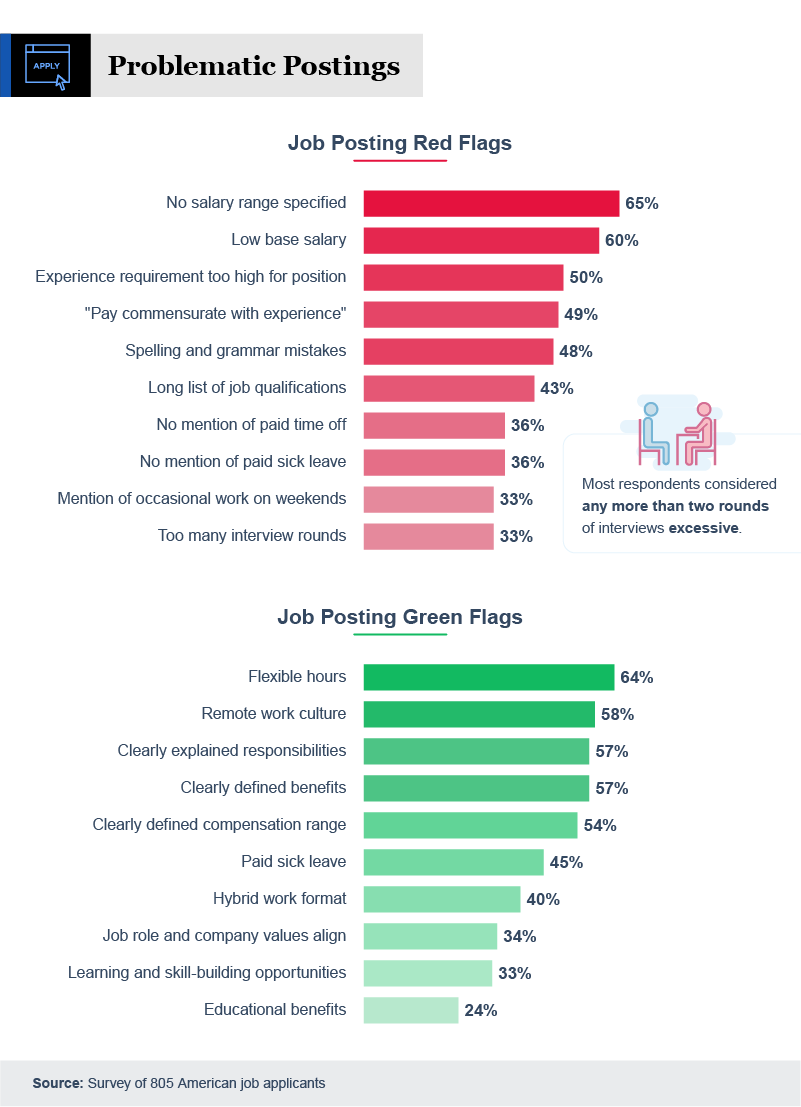
The contents of the job advertisement posed a threat to applicant interest as well. Candidates were specifically concerned about how the posting handled salary details: 60% felt it was problematic if the base salary was too low, but even more candidates thought it was a problem if there was no salary range specified at all. Fortunately for job seekers, many companies are required to publish their salary ranges and more may be required in the future. In New York City, for example, they will soon be required to include wage information. In an effort to promote pay equity , the city recently passed legislation requiring job listings to include a salary or hourly range starting in November 2022.
The increased interest in remote work opportunities has also impacted how a job posting is perceived. Ads stipulating exclusively on-site work were a red flag, according to 30% of respondents. Conversely, 58% of respondents said that explicitly mentioning remote work culture was a positive. But not all generations were equally interested: 64% of millennials and 61% of Gen Xers thought the possibility of remote work was a green flag, while only 45% of Gen Zers felt enthusiastic about working outside the office. But it was more than simply job characteristics that impacted applicants, even the phrasing could make them wary.
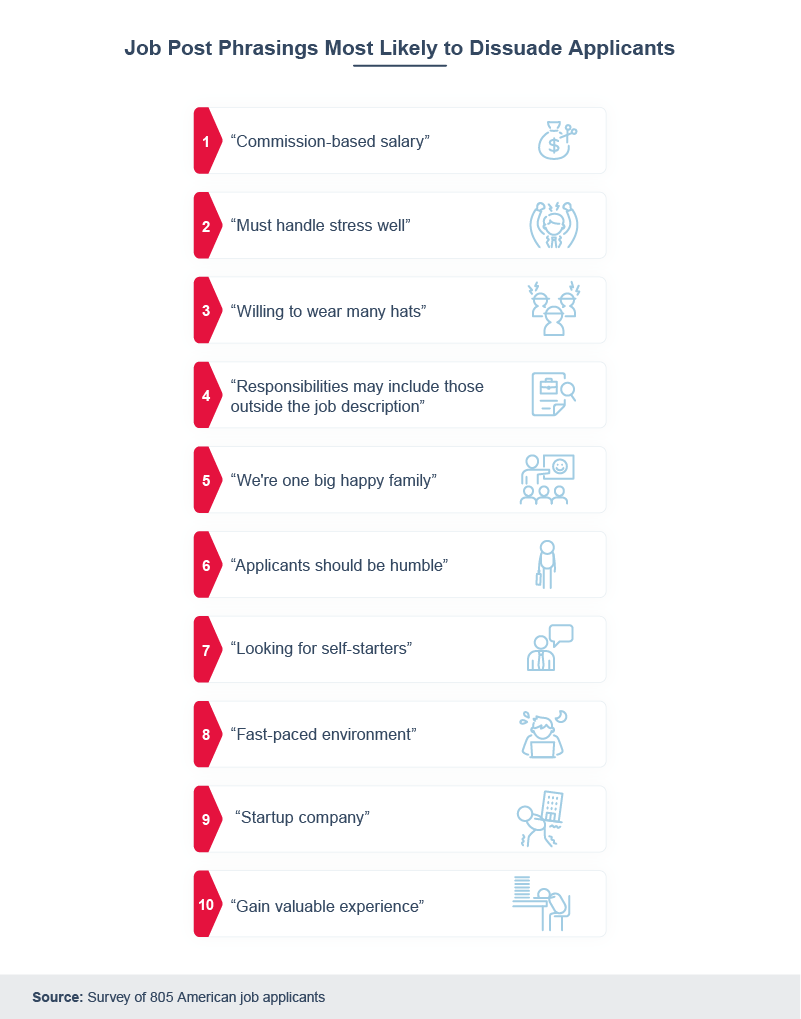
All generations surveyed agreed that "commission-based salary" was the No. 1 phrase that turned them off from a job listing. When looking specifically at gender, women most disliked the phrase "commission-based salary," but men most disliked the phrase "must handle stress well." Other problematic phrases were those indicating a variety of duties for one role, such as "willing to wear many hats" and "responsibilities may include those outside the job description." Both of these phrases are likely more worrisome today than in years prior, as employees remaining at their workplaces during the Great Resignation may be feeling more burnout and anxiety; having to wear many "hats" and take on additional stress isn't likely to entice candidates who are looking for greener pastures.
Defining a Bad Interview
As we worked our way further along the hiring process from applying to interviewing, we asked respondents about the negative experiences they've endured during interviews and how it affected their interest in the company.
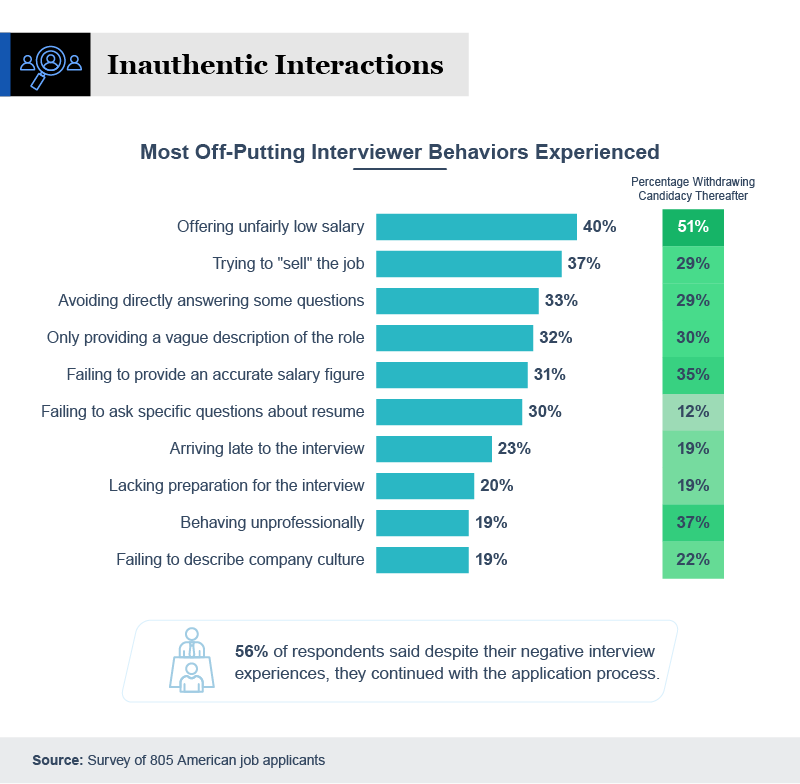
The interview process proved to be a negative one for many. More than a third of respondents described the experience as a sales pitch. Forty percent said the interviewer offered them an unfairly low salary, while 33% said the interviewer avoided answering some of their questions. Overall, an unfairly low salary offer was the most likely way to get a candidate to withdraw their candidacy.
While losing out on a great candidate due to a bad interview may seem like a nightmare to hiring managers, there are easy practices that interviewers can use to help prevent mistakes. More good news for hiring managers is that 56% of respondents said that despite their bad interview experience, they chose to continue with the process . This might be an indicator that finding a new job can be harder than expected. Some applicants may still be finding it difficult to get hired in the current job market. Candidates may be picky with which jobs they apply to, but once they've applied and interviewed, they're likely going to see it through, even if they had a bad interview experience.
What's Raising Employers' Eyebrows?
After exploring the applicant's experience, we gave employers the chance to share their perspective. In the next section of our study, hiring managers explained how they evaluate potential candidates.
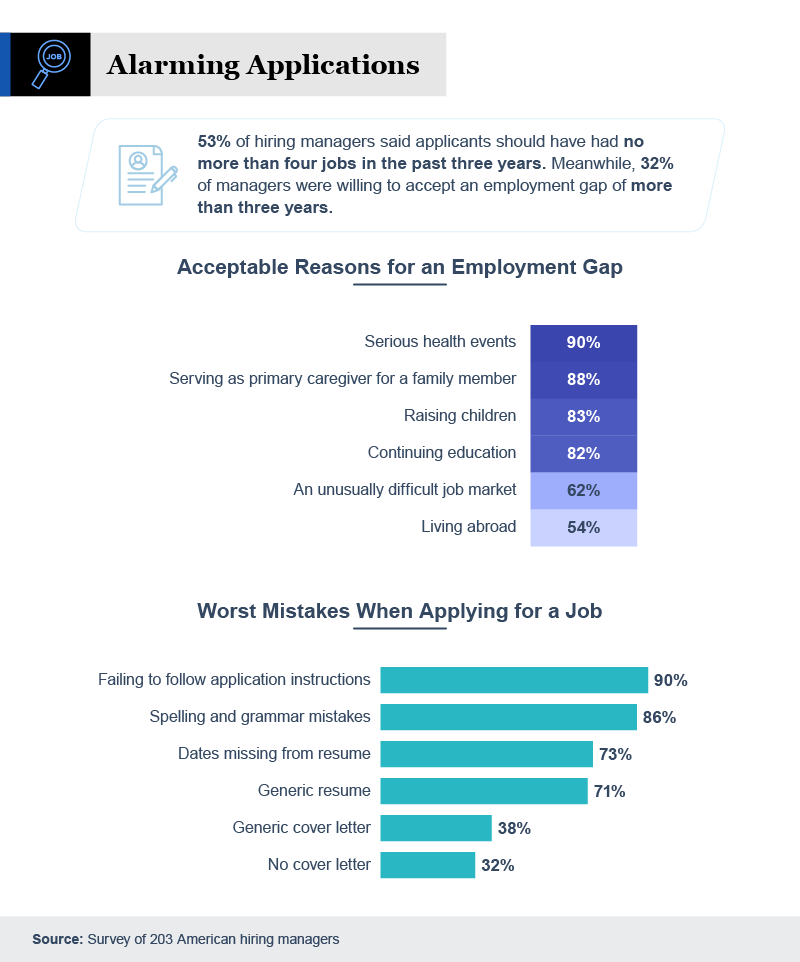
With employees leaving their jobs in droves, employers have less room to critique applicants. Employment gaps may no longer be an important consideration for employers. Many hiring managers were quite open as to what they considered a reasonable employment gap. For instance, 62% of employers considered "an unusually difficult job market" a sufficient explanation. Moreover, 5% of hiring managers said that a gap for any reason was acceptable.
Employers had other pet peeves, however. Failure to follow application instructions was the most commonly mentioned red flag for employers. They were also frustrated by things like spelling and grammatical errors. Even if spelled correctly, a generic cover letter was considered bothersome. There has already been much debate on the value of a cover letter, and our research suggests that they are certainly futile when not unique.
What Do Hiring Managers Really Want?
Getting candidates from the initial application stage to the interview isn't always easy. On average, respondents from this study were interviewing eight candidates per available position out of sometimes hundreds of applications. Creating an effective applicant screening system is vital to finding the right people to interview. The final section of our study gave hiring managers the opportunity to explain exactly how they evaluate candidates once they finally made it to the interviewing phases.
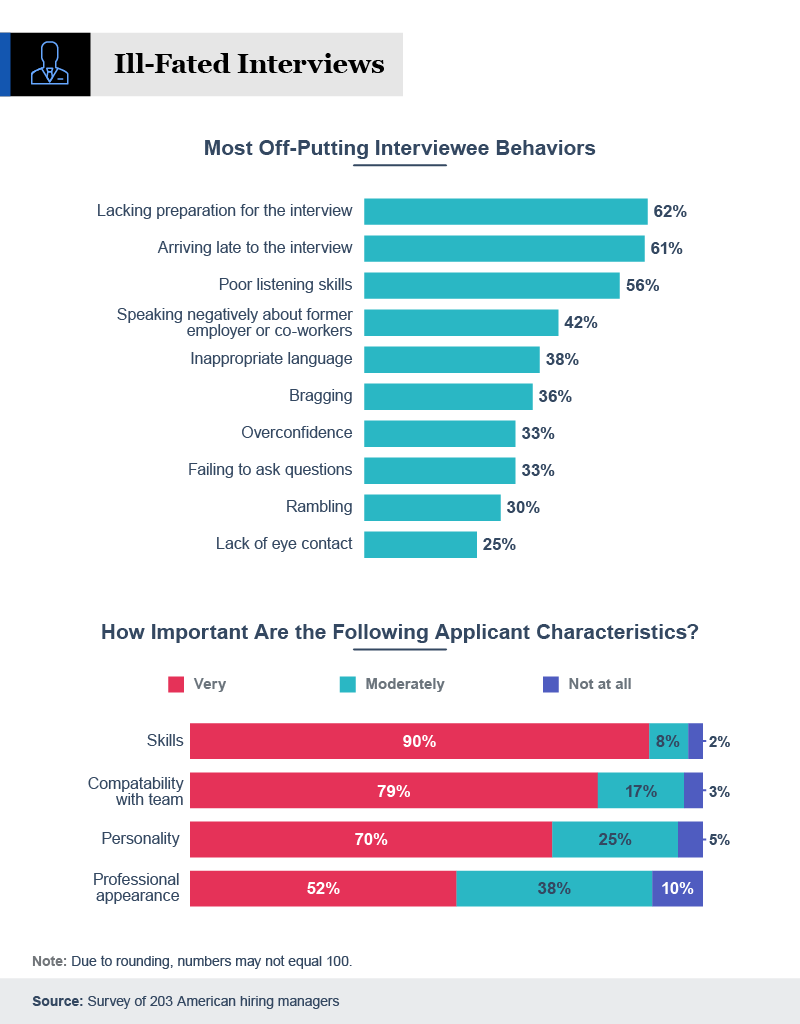
There were many opportunities for candidates to take themselves out of the running before the interview process even began. Over 60% of interviewers felt it was problematic for a candidate to be late or unprepared. Considering the importance of making a good first impression, arriving late is clearly detrimental to an applicant's chance of getting hired.
Hiring managers cared most about an applicant's skill set as opposed to their professional appearance, which only around half of employers thought was very important. This information comes amid a societal shift toward a more inclusive definition of what it means to look professional . Moreover, remote work has also heavily influenced our concept of professional appearance. With so many people working out of their private living spaces, a more casual style has become accepted in workplaces around the country.
Searching for and Securing Dream Jobs
Certainly, the American job market has arrived at an interesting crossroad. Applicants are still trying to appeal to employers, but now companies must also work harder to entice applicants. Broadly, job seekers are looking for a fair, clearly outlined salary and detailed job descriptions. Not articulating these things from the start may ultimately prevent many from even applying. Hiring managers also have fairly lenient standards, simply wanting interviewees to arrive on time and draft unique cover letters. Even gaps in employment don't pose a problem for many of them.
Understanding both sides of the hiring process is essential when trying to find the perfect candidate for any available position. It's not easy, but Paychex can support you every step of the way. Dedicated to helping your business acquire and retain the best talent, Paychex can help with recruiting new applicants, tracking new candidates, onboarding your new hires, and much more.
Methodology and limitations
We surveyed 805 Americans who had looked for a job in the past year, as well as 203 hiring managers. Of the job applicants, 138 were from Generation X or older, 418 were millennials, and 249 were Gen Zers. Additionally, 466 were women, 309 were men, and 30 were nonbinary or genderfluid. For the hiring managers, 18 were baby boomers, 63 were Gen X, and 122 were millennials or younger. There were 94 women and 109 men. Both surveys relied on self-reported data. There are a number of limitations associated with self-reported data, such as telescoping, exaggeration, and selective memory.
Fair use statement
Do you know of a company trying to hire new employees or someone trying to impress a difficult hiring manager? Feel free to share the results of our study for noncommercial purposes. We just ask that you link back to this site when doing so.
Tags







